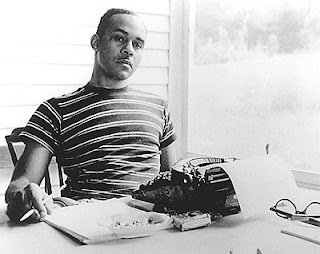Ralph Ellison and How the Self Floats

Still from the film "Ralph Ellison: An American Journey" It seems to me that Ralph Ellison may be this country's most important writer. Not so much for his production or even his style, but because of his deep wisdom and his remarkable understanding of the links between literature, politics, and our national struggle with the culture of identity. Every time I read essays like "Indivisible Man," "The Novel as a Function of American Democracy," or "Going to the Territory," I find a new perspective on life and am constantly amazed by the little jewels of truth that sparkle beneath the waters of Ellison's words. The greatest influence on Ralph as a writer was Fyodor Dostoevsky. Invisible Man was Ellison's "Notes from the Underground." To me, Ralph Ellison did so much more than elevate Dostoevsky to the 20th century. He pointed at the universality of true human experience, that push and pull of soul, identity, culture, politics